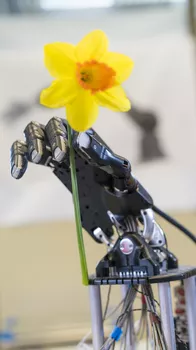Complex Reflexes for Low-Level Robotic Systems

- Sponsored by: Siemens AG, Corporate Technology
- Scientific Lead: Dr. Martin Bischoff
- Project Lead: Dr. Ricardo Acevedo Cabra
- Term: Summer semester 2018
Modern technologies enable accurate physical simulations, which are even faster-than real time by orders of magnitude. These can be used for low-level robotic controllers to rapidly explore their scope of action and identify a situation-specific optimized control sequence. In detail, a control system similar to the nervous system of human beings can be realized, which continuously evaluates MB)what-if-scenarios and exhibits reflexes, such that local nodes independently perform complex, yet time-pressed actions as catching a falling object.
Project Phase 1 (Summer 2018):
Within this first project phase we set up a co-simulation framework in which robotic systems communicate tasks to a simulation server which applies machine learning methods and returns the most promising strategy back to the robots. We apply and test that framework on real mechatronic and robotic system prototypes developed in our department.
A central software component for this project is ROS#, which provides a communication interface between ROS (Robotic Operating System) and Unity (gaming development platform with fast physics solvers). ROS# has been developed by our research group and is open source on GitHub.
Results: The results of this project were summarised in the final presentation (29 MB).